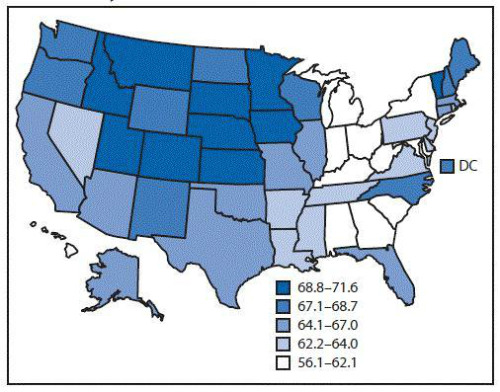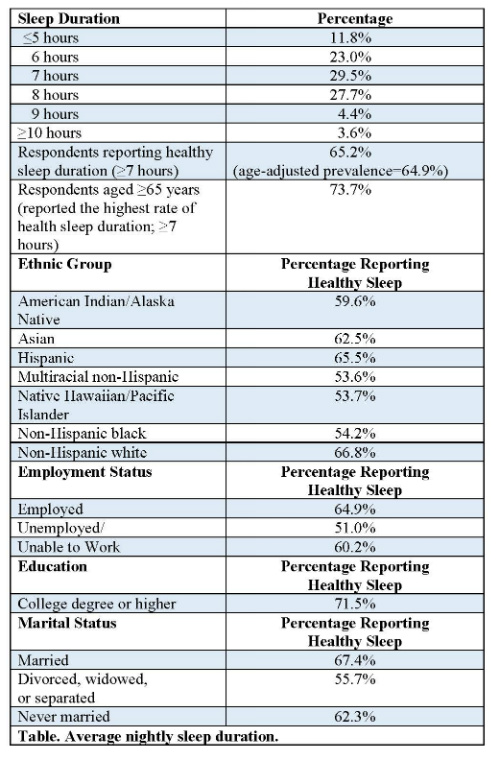- Sleeping <7 hours per night is associated with increased risk for obesity, diabetes, high blood pressure, coronary heart disease, stroke, frequent mental distress, and all-cause mortality, according to the CDC.
- Insufficient sleep impairs cognitive performance, which can increase the likelihood of motor vehicle and other transportation accidents, industrial accidents, medical errors.
- Elderly and single parents at greatest risk of disordered sleep.
- Good sleep hygiene can significantly improve sleep quality and duration.
A recent issue of the Centers for Disease Control and Prevention’s (CDC) Morbidity and Mortality Weekly Report (WWMR) reveals that more than 83 million Americans are not getting enough sleep. Disordered or insufficient sleep has been linked to increased risk for obesity, diabetes, high blood pressure, coronary heart disease, stroke, frequent mental distress, and all-cause mortality. Insufficient sleep impairs cognitive performance which can increase the likelihood of motor vehicle and other transportation accidents, industrial accidents, medical errors, and decreased work productivity, the authors noted. (Figure.)

The Analysis
The CDC investigators analyzed data from the 2014 Behavioral Risk Factor Surveillance System (BRFSS) to identify the percentage of Americans who sleep ≥7 hours of sleep per night. Among 444,306 respondents aged 18 to 60 years, representing all 50 states and the District of Columbia, the investigators found that just 65.2% reported a healthy sleep duration. “The age-adjusted prevalence of healthy sleep was lower among non-Hispanic blacks, American Indians/Alaska Natives, Native Hawaiians/Pacific Islanders, and multiracial respondents, compared with non-Hispanic whites, Hispanics, and Asians," the researchers wrote.
Among the states, estimates of prevalence of healthy sleep duration ranged from just 56.1% in Hawaii to nearly 72.6% in South Dakota. The lowest prevalence of healthy sleep duration was clustered in the southeastern U.S. and in states along the Appalachian Mountains. The highest prevalence was observed in the Great Plains states. More than 30% of respondents reported sleeping <7 hours in a 24-hour period. (See Table.)

CDC Recommendations
The CDC identified a need for public awareness and education about the importance of healthy sleep. Of particular concern is the need for healthy sleep duration among shift workers, particularly medical professionals, emergency response personnel, and transportation industry personnel. Healthcare providers need to discuss the importance of healthy sleep habits with patients and to address the causes of poor sleep hygiene.
The CDC further recommended that clinicians routinely discuss sleep health with patients and explore poor sleep hygiene as a part of usual healthcare. “Healthy sleep duration in adults can be promoted by sleep health education and behavior changes, such as setting a pattern of going to bed at the same time each night and rising at the same time each morning; making sure that the bedroom environment is quiet, dark, relaxing, and neither too hot nor too cold; turning off or removing televisions, computers, mobile devices, and distracting or light-emitting electronic devices from the bedroom; and avoiding large meals, nicotine, alcohol, and caffeine before bedtime,” wrote the authors of the CDC report.
“Keeping a 10-day sleep journal or diary about sleep times, napping, and behaviors that affect sleep, such as exercise, alcohol use, and caffeine consumption, might be helpful before discussing sleep problems with a physician,” they added.
Insomnia symptoms can be resolved with improved sleep habits or psychological or behavioral therapies. Over-the-counter or prescription sleep aids are not recommended.
The authors of the CDC report advised strategies to reduce risks associated with shift work and long work hours including designing better work schedules. Evaluation and monitoring of sleep should be considered routine care among healthcare professionals.
